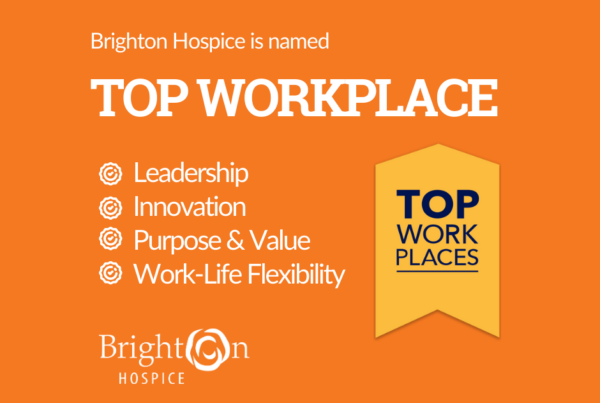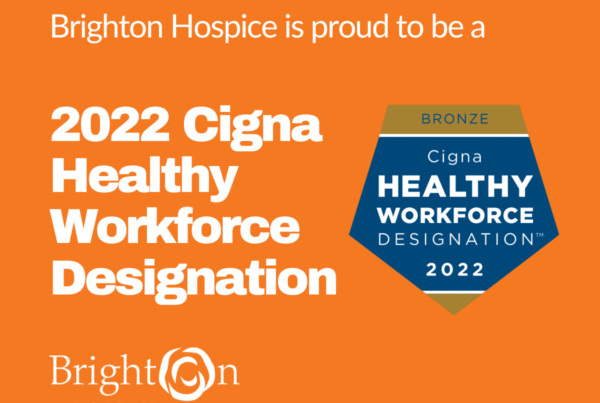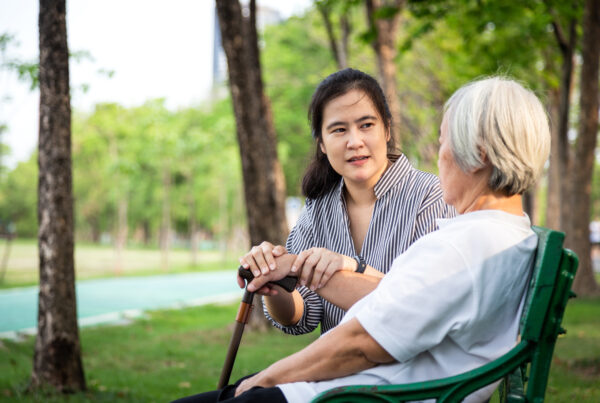Hospice: A Companion Through End of Life
Karla Johnson, Chaplain at Brighton’s Utah Hospice
Only minutes before we had been teasing, laughing, cuddling and enjoying a few quiet moments together before the doctor came. It had been one of Jeff’s better mornings. But now we sat in stunned silence unable to respond or move. We could only stare at the pulmonary specialist as he asked, “Do you have any questions?”
What does one say when the doctor unexpectedly announces it’s time to go on hospice? While we did not understand what hospice was at the time, feelings of sadness and dread were associated with the word. For many people, the word “hospice” itself causes anxiety, fear and apprehension.
My husband had been dealing with a chronic illness for five years. During that time I had watched him change from a strong, tall, virile man to a frail, thin one, who struggled to walk across a room. We knew eventually he would die of the illness but still experienced shock upon hearing that his time was near.
“What am I to do now, give up? What’s the purpose of trying to go on living?”
Knowing that death is coming can take an emotional toll on the person dying and their loved ones. Some of the common emotions families experience include:
- Anger and frustration: Life has changed or been interrupted, it doesn’t seem fair.
- Fear and anxiety: What’s going to happen to the family? There seems to be fear of the dying process or afterlife.
- Loss of meaning in life: Reviewing life and purpose.
- Grief: Grieving not only loss of now but future life with family or loved one.
- Guilt and regret: For things said or not said, done or not done.
The first comment Jeff made after the doctor left the room was, “What am I to do now, give up? What’s the purpose of trying to go on living? He was angry. As a spouse, I experienced my own feelings; anger at him for not taking better care of himself; angry about the future we would not share together; fear of living without him; of watching him die, etc. Life had changed for us. We were not sure what to expect. It was definitely not what any of us wanted.
But death is part of life. We will all experience it. Being able to have a hospice companion help the patient and their families through this time can be very comforting and beneficial. The purpose of hospice has often been misunderstood.
Hospice’s goal is to provide a better quality of life, not quantity. The goal is to help those at end of life get the most out of the life they have remaining. That means free of pain, alert and able to live life the best they can in their situation.
“The hospice team becomes a companion to the patient and loved ones”
Hospice is about being able to die in comfort, with dignity and peace, surrounded by loved ones in one’s own home/environment.
Hospice provides clinical, emotional and spiritual support which is a holistic approach. The hospice team becomes a companion to the patient and loved ones as they maneuver towards the end of life.
Interestingly, research has shown that the health of many people actually improve while on hospice care, but the word “hospice” is used in this context as a way to announce the impending death of a loved one.
At the end of my husband’s life, we had come to a place of acceptance, each having processed his decline in our own way. In those final months, he was able to come off of many of his medications, which lifted his spirits. He was made comfortable when pain flared. It was wonderful to let a nurse take care of the medications and make those clinical decisions that were frightening for me. I had been his nurse for so long and now I could just be his wife. Jeff attended family functions with the help of hospice. At the end, he was made comfortable and passed with his family by his side.
“I truly feel it is one’s faith, spirituality and family that will help them through this time.”
Not only have I experienced the support of hospice in my own life, but as a Chaplain for Brighton’s Utah hospice, I have been a witness to many of these emotions experienced by our Utah hospice patients and their loved ones. In many cases, the patient and family do not know what to expect. Some even experience denial. It is a difficult experience to go through. Due to the loss of my spouse, my perspective has changed just as they have for many who have lost loved ones. There is a different understanding about loss.
As a non-denominational Chaplain for our Utah hospice, my role is not only to provide spiritual support as needed but also to listen and provide emotional support and comfort to the patient and family. When I enter a home, I leave my faith outside and am there to visit with the family about their faith or spirituality. I truly feel it is one’s faith, spirituality and family that will help them through this time. As a Chaplain I am also a “listener”. Many times families have been able to open up about their fears, frustrations, anger, regrets, grief, etc. when it was difficult for them to share with family or friends. I am a witness to their life and pain in that moment. Being able to talk to someone who will keep a conversation confidential, listen without judgment, and show love and concern will go a long way in helping one process, validate and heal.
As a Chaplain, it is an honor and privilege to serve God and the families dealing with one of the most difficult times in life: the loss of a loved one. I feel deep gratitude for the opportunity to serve as a Chaplain in hospice and palliative care. I am able to see God’s hands in the lives of these families every day.
If you are in need of a skilled and experienced hospice team in Utah, Minnesota, Nevada, or Oregon to be a companion your loved one, please contact us.




